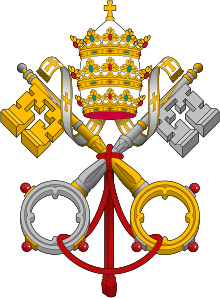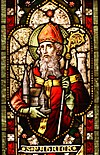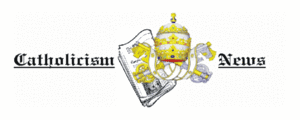Portal:Catholic Church
Introduction The Catholic Church, also known as the Roman Catholic Church, is the largest Christian church, with 1.39 billion baptized Catholics worldwide as of 2022. It is among the world's oldest and largest international institutions, and has played a prominent role in the history and development of Western civilization. The church consists of 24 sui iuris churches, including the Latin Church and 23 Eastern Catholic Churches, which comprise almost 3,500 dioceses and eparchies located around the world. The pope, who is the bishop of Rome, is the chief pastor of the church. The Diocese of Rome, known as the Holy See, is the central governing authority of the church. The administrative body of the Holy See, the Roman Curia, has its principal offices in Vatican City, a small independent city-state and enclave within the Italian capital city of Rome, of which the pope is head of state. The core beliefs of Catholicism are found in the Nicene Creed. The Catholic Church teaches that it is the one, holy, catholic and apostolic church founded by Jesus Christ in his Great Commission, that its bishops are the successors of Christ's apostles, and that the pope is the successor to Saint Peter, upon whom primacy was conferred by Jesus Christ. It maintains that it practises the original Christian faith taught by the apostles, preserving the faith infallibly through scripture and sacred tradition as authentically interpreted through the magisterium of the church. The Roman Rite and others of the Latin Church, the Eastern Catholic liturgies, and institutes such as mendicant orders, enclosed monastic orders and third orders reflect a variety of theological and spiritual emphases in the church. Of its seven sacraments, the Eucharist is the principal one, celebrated liturgically in the Mass. The church teaches that through consecration by a priest, the sacrificial bread and wine become the body and blood of Christ. The Virgin Mary is venerated as the Perpetual Virgin, Mother of God, and Queen of Heaven; she is honoured in dogmas and devotions. Catholic social teaching emphasizes voluntary support for the sick, the poor, and the afflicted through the corporal and spiritual works of mercy. The Catholic Church operates tens of thousands of Catholic schools, universities and colleges, hospitals, and orphanages around the world, and is the largest non-government provider of education and health care in the world. Among its other social services are numerous charitable and humanitarian organizations. (Full article...) Selected article
 Mangalorean Catholics are Roman Catholics from the former South Canara district on the southwestern coast of India. They are Konkani people and speak the Konkani language. Portuguese shipping arrived in Mangalore in 1526, and Catholic missionary activities began around 1534, when Canara was placed under the ecclesiastic jurisdiction of the Bishop of Goa. Most of the ancestors of Mangalorean Catholics were Goan Catholics, who had migrated to South Canara from Goa, a state north of Canara, between 1560 and 1763 during the Goa Inquisition and the Portuguese-Maratha wars. Gradually they learned the languages of South Canara but retained Konkani as their mother tongue. In time, they referred to themselves as Mangalorean Catholics to distinguish themselves from their ancestors from Goa. The most disconsolate memory in the community's history was a 15-year captivity imposed by Tipu Sultan, the de facto ruler of Mysore, from 24 February 1784 to 4 May 1799 at Seringapatam. After the defeat of Tipu Sultan, the community resettled in South Canara, and gradually prospered under the British. The culture of Mangalorean Catholics is a blend of Canarese and Goan cultures. After migration, they adopted the local Canarese culture but retained many of their Goan customs and traditions. The Mangalorean Catholic diaspora is scattered across the globe, with emigrant communities in the Arab states of the Persian Gulf and the English-speaking world.
Selected image
 Credit: Leonardo da Vinci Leonardo da Vinci's cartoon The Virgin and Child with St Anne and St John the Baptist combines two themes popular in Florentine painting of the 15th century: the Virgin and Child with St John the Baptist and the Virgin and Child with St Anne. Selected biography
 James VI and I (19 June 1566 – 27 March 1625) was King of Scots as James VI, and King of England and King of Ireland as James I. He ruled in Scotland as James VI from 24 July 1567, when he was only one year old, succeeding his mother Mary, Queen of Scots, who had been forced to abdicate. Regents governed during his minority, which ended officially in 1578, though he did not gain full control of his government until 1581. On 24 March 1603, as James I, he succeeded the last Tudor monarch of England and Ireland, Elizabeth I, who died without issue. He then ruled England, Scotland and Ireland for 22 years, until his death at the age of 58. James achieved most of his aims in Scotland but faced great difficulties in England, including the Gunpowder Plot in 1605 and repeated conflicts with the English Parliament. According to a tradition originating with historians of the mid-seventeenth-century, James's taste for political absolutism, his financial irresponsibility, and his cultivation of unpopular favourites established the foundation for the English Civil War.
Did you know...

Related portalsFeast Day of May 17
Selected quote

News
SubcategoriesTopics
The Holy Bible:
Particular Churches (grouped by liturgical rite):
Things you can do
External resourcesWikiProjectsAssociated WikimediaThe following Wikimedia Foundation sister projects provide more on this subject:
Discover Wikipedia using portals |

































